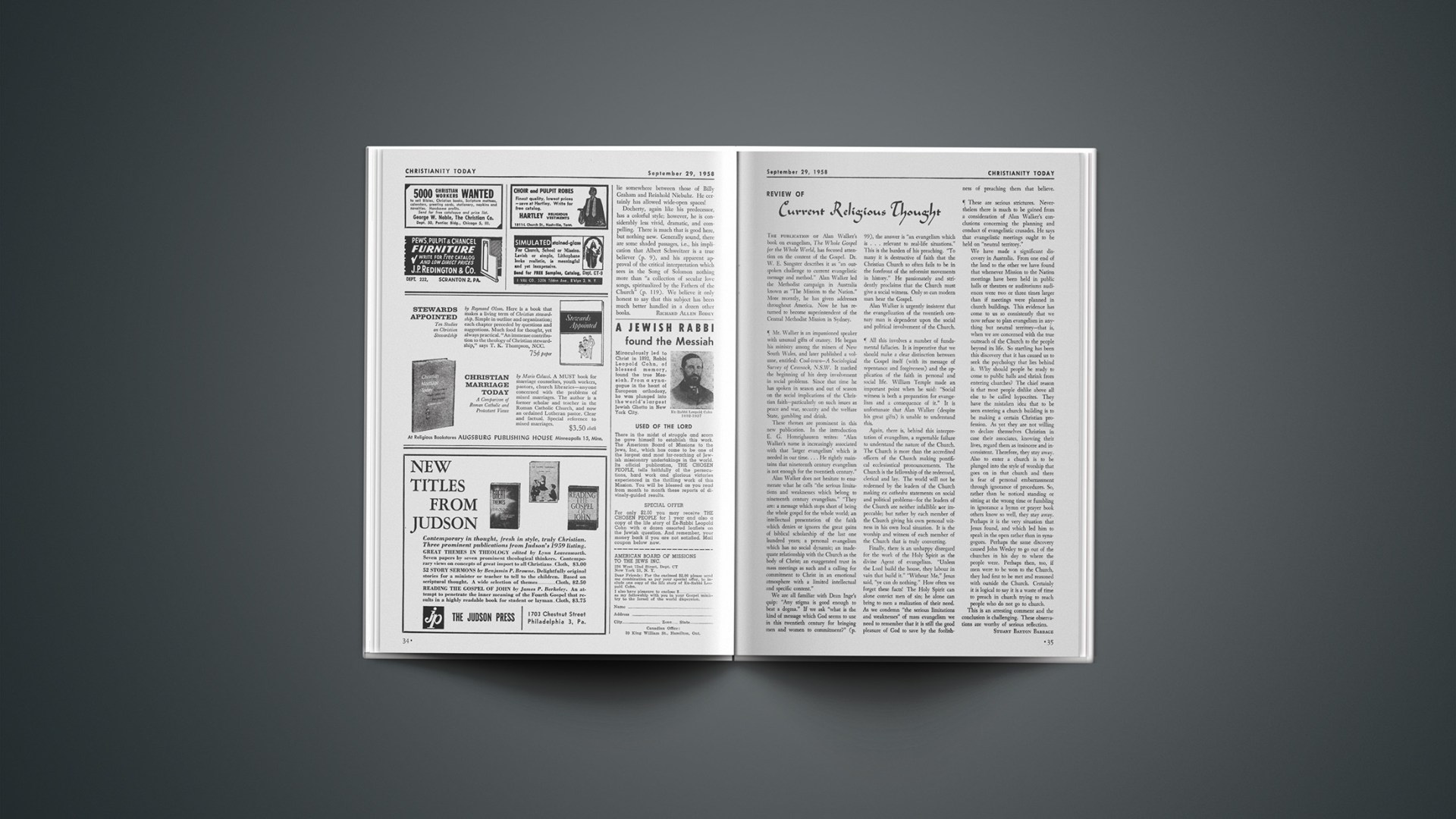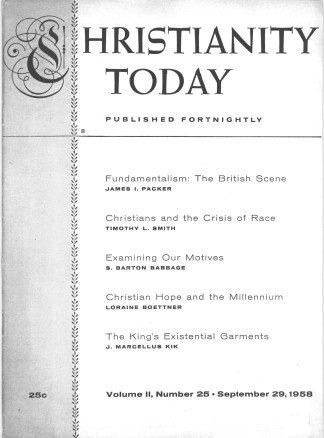Authority Of Scripture
Authority, by D. Martyn Lloyd-Jones (Inter-Varsity Fellowship, London, 94 pp. 3s) and “Fundamentalism” and the Word of God, by J. I. Packer (Inter-Varsity Fellowship, London, 191 pp., 4s. 6d.) are reviewed by Donald Guthrie of the London Bible College.
Both these books deal with the problem of the Christian’s ultimate authority, although they treat it from rather different points of view. Dr. Lloyd-Jones has an essentially practical aim, whereas Dr. Packer’s plan is more systematic. The former book contains the substance of three addresses and retains the characteristics of the preacher’s style. It deals with the authority of Jesus Christ, of the Scriptures, and of the Holy Spirit. The author shows that evangelicals base their doctrine on Christ’s doctrine of Scripture. The only alternative to accepting on this basis the full authority of Scripture, is to acknowledge the uncertain authority of “modern knowledge” and “human ability.” Dr. Lloyd-Jones sees the issue as a clear alternative between Christ and the critics. Those who class themselves among the critics will find many challenging statements in this little book. In his chapter on the Holy Spirit the author shows special interest in the phenomena of revivals in which the authority of the Spirit is particularly manifest, and he makes a strong plea for more earnest prayer that the Spirit might again manifest his power in the Church.
Dr. Packer’s book performs several invaluable services for evangelicals. He makes clear that the manner in which the word “fundamentalism” is often used by liberal critics is not only misinformed but positively misleading. He points out that a different situation exists in Britain and America, since in the former the word has been employed by critics to describe a completely mechanical theory of inspiration, whereas in the latter it was coined by evangelicals themselves to denote their fundamental beliefs. Dr. Packer pleads that the word should be disused and replaced by the word “evangelical.” If this advice is followed a good deal of misrepresentation of the conservative position would be swept away. In his carefully reasoned chapter on “authority” Dr. Packer asserts that liberal critics are essentially subjectivists, who exalt
Christian reason to the position of arbiter to decide what is and what is not the word of God in the Scriptures. He rightly points out that the only sound approach to biblical interpretation is to submit the method used to the testimony of the Bible itself.
Dr. Packer gives a very lucid account of the evangelical doctrine of Scripture. He rejects as a critical “man of straw” the dictation-theory of inspiration, which he claims no serious evangelical scholar has ever maintained. The Bible is “word for word God-given; its message is an organic unity, the infallible Word of an infallible God” (pp. 113–114). Dr. Packer suggests that the problems and difficulties raised by biblical interpretation (e.g. problems of harmonization) cannot be considered a sufficient reason for disputing the evangelical doctrine of inspiration, since every other Christian doctrine raises problems unresolvable by human reason. In other words, the doctrine itself does not depend on rational demonstration. Dr. Packer clearly brings out the basic character of the differences separating conservative and liberal theologians. In the modern expositions of biblical theology he sees an example of the inconsistency which so often vitiates the liberal approach, since what is really in mind is not the theology of the Bible, but the theology of what subjective opinion declares to be “biblical.” Evangelicals can find little common ground with such a subjective approach that has been prevalent in liberal circles.
The important issues of faith and reason have a chapter each, while a concluding chapter on liberalism contains a penetrating comparison between the old and the new. This is a small but amazingly comprehensive book which will supply evangelicals with a reasoned statement of their own position and challenge liberals to re-examine their fundamental presuppositions.
DONALD GUTHRIE
Subjective Rationalism
Can People Learn to Learn?, by Brock Chisholm (Harper, 1958, 143 pp., $3), is reviewed by Arthur H. De Kruyter, Minister of the Christion Reformed Church of Western Springs, Illinois.
The title of the book is misleading, since the bulk of the material is on the content rather than on the technique of learning. Harping on an old theme, in almost every chapter Chisholm discredits the church by declaring it to be responsible for the problems of the world. And what is even worse, according to the author, is that the church is now the major institution preventing the necessary humanistic changes which can save the world from complete disaster.
The book contains a lopsided view of the world. Chapter 2 describes nations and continents from a so-called objective viewpoint which blames religion for promoting selfishness, exploitation, bad government, and other cleverly devised ills. Chapters 4 to 9 discuss problems of anxiety, aggression, population control by state birth controls, natural resource controls, a world language and monetary system, racial barriers, and the supremacy of the mind in contrast to authoritarian revelation of God. Mr. Chisholm has solutions for all of these problems and repeatedly states that the United Nations, which is destined to become the seat of the inevitable world government, is the answer.
The last four chapters deal with education—both method and content. Needless to say, there is no room in his curriculum for authority or convictions. A subjective rationalism is the genius of his system.
Having read other writings of Chisholm, father of the Mental Health Movement, it was not surprising to read his caricatures and abuses of the church and religion. What is surprising is that Harper has published such a brazen attack on Americanism and Christianity.
ARTHUR H. DE KRUYTER
Wide-Open Spaces
One Way of Living, by George M. Docherty (Harper, 1958, 173 pp., $3) is reviewed by Richard Allen Bodey, Minister of Third Presbyterian Church of North Tonawanda, New York.
Like Peter Marshall, his illustrious predecessor at the New York Avenue Presbyterian Church in Washington, D. C., George Docherty is a Scot who turned to preaching after having already embarked on another vocation. The present volume, his first, discusses the basic and broader aspects of Christian commitment under four headings: The Way, Decision For The Way, Difficulties In The Way, Discipleship In The Way. The chapters are revisions of messages preached from the New York Avenue pulpit.
The author’s purpose is to provide answers to questions concerning the nature of conversion and its issue, answers which lie somewhere between those of Billy Graham and Reinhold Niebuhr. He certainly has allowed wide-open spaces!
Docherty, again like his predecessor, has a colorful style; however, he is considerably less vivid, dramatic, and compelling. There is much that is good here, but nothing new. Generally sound, there are some shaded passages, i.e., his implication that Albert Schweitzer is a true believer (p. 9), and his apparent approval of the critical interpretation which sees in the Song of Solomon nothing more than “a collection of secular love songs, spiritualized by the Fathers of the Church” (p. 119). We believe it only honest to say that this subject has been much better handled in a dozen other books.
RICHARD ALLEN BODEY










